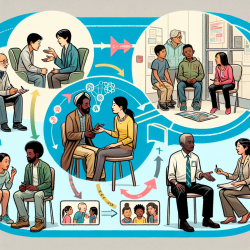Introduction
In the realm of global mental health, the challenge of effectively delivering interventions in middle-income countries (MICs) has been a topic of rigorous debate and study. The research article titled A Multiple Case Study of Mental Health Interventions in Middle Income Countries: Considering the Science of Delivery provides valuable insights into non-specific, delivery-focused strategies that can significantly enhance the effectiveness of mental health interventions. This blog aims to distill key findings from the study and offer guidance for practitioners seeking to improve their skills and outcomes in similar contexts.
Key Findings from the Study
The study highlights two primary themes that are crucial for successful intervention delivery in MICs: leverage and creating space to work. These themes are underpinned by several sub-themes, including leadership, empowerment, and stakeholder engagement.
Leverage and Creating Space
Leverage involves maximizing the impact of available resources and applying pressure at strategic points within complex systems to induce significant change. Creating space, on the other hand, refers to cultivating the necessary social, cultural, and policy environments that support intervention efforts. Together, these themes emphasize the importance of a holistic approach to mental health interventions.
Leadership
Effective leadership is characterized by a deep understanding of the mental health issues at hand, coupled with the ability to engage and align diverse stakeholders. Leaders in the study demonstrated empathy, strategic thinking, and a commitment to building trust and respect within communities.
Empowerment
Empowering service recipients was a cornerstone of the interventions studied. This approach not only reduced stigma but also enhanced the reach and impact of the interventions by fostering a sense of agency and capability among individuals with mental health challenges.
Stakeholder Engagement
Engaging key stakeholders, including government bodies, community leaders, and the media, was essential for creating the necessary social capital and policy support. This engagement facilitated the scaling and sustainability of interventions, ensuring they were culturally and contextually relevant.
Implications for Practitioners
Practitioners can enhance their skills by adopting a systems dynamic approach to mental health interventions. This involves recognizing the complex, non-linear nature of mental health challenges and identifying leverage points where small changes can lead to significant improvements.
- Develop a deep understanding of the local context and cultural nuances.
- Foster strong leadership qualities, such as empathy, strategic thinking, and effective communication.
- Empower service recipients to take an active role in their mental health journey.
- Engage with a broad range of stakeholders to build social capital and policy support.
By integrating these strategies, practitioners can improve the delivery and effectiveness of mental health interventions in MICs, ultimately leading to better outcomes for individuals and communities.
To read the original research paper, please follow this link: A Multiple Case Study of Mental Health Interventions in Middle Income Countries: Considering the Science of Delivery.










